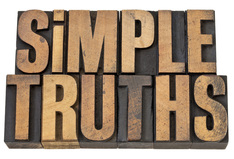
Why do people say, "I'm sorry" when they've done nothing wrong?
If I share something that is challenging or that happened that's not pleasant and I receive a "I'm sorry" it tells me a lot about the person and if they're on my page with 'sorry.' In this circumstance, 'sorry' colludes with an idea there is something wrong. It robs me of the full experience to see the challenge as an opportunity. We as a collective need to give the word "SORRY" some much needed boundaries. The meaning of "I'm sorry" when someone apologizes conveys some level of responsibility. So how did it happen that we as a society say, "I'm so sorry" for someone's loss, or challenge when we had nothing to do with causing it? Here's what "sorry" subtly does: 1. Speaks to the person saying its subconscious mind that by 'being sorry' they are somehow doing something to lighten the load off the other person- so they're shifting responsibility from the person experiencing the trauma, sadness, loss or challenge to themselves in order to 'help.' 2. It disempowers the person experiencing the challenge because it removes full responsibility from them. By responsibility I am referring to the fact that we create our reality and as a matter of fact, every circumstance is an opportunity for some level of growth- spiritually, physically, emotionally... I'm not being cold. There is always space for support without 'being sorry.' I'm just putting forth the need for us to reevaluate how, why and when we use this loaded phrase. 3. And lastly when we say "Oh I'm so sorry" what we do is collude with someone else's story. Most of the time people share what they're experiencing or challenges for a few of the following reasons: sometimes purely to vent, sometimes to reinforce a disempowering story, and sometimes to express an underlying 'need' for love, support, attention, or validation. None of the above are bad. Part of surrounding yourself with people committed to saying what they mean and meaning what they say, or working one on one with a mentor/coach is you will be held powerfully. You don't get away with saying things that are just default from our conditioning. Most folks haven' stopped to question themselves and why they apologize to everyone for everything. So when a client of mine tells a story that is disempowering and comes from a place of need- or an old belief system, in a most supporting and soulfully loving way, I will stretch them to see how they are colluding with their old story, their old belief system, and their old way of reacting or responding. This empowers them to choose more meaningful words of influence. We are able to change our perception and see possibilities when we are empowered. We are also able to take responsibility for the challenges that show up in our lives. So one person asked, "What about when someone you love dies? How is this a challenge we are to take responsibility for?" Of course we are not the cause of this great loss. In a situation where someone is passing we have a whole lot to learn about the process of death and the spiritual gifts that are present. Grief from loss, trauma and tragedy offer us a way to deepen our relationship with Spirit and the energy of death. I'm writing this with the intention that we all become more aware of when we say "Sorry," how we say "Sorry," and WHY we say "Sorry." What could you say instead that conveys support, compassion, love and an opportunity for growth? Intentionally,
1 Comment
Susan
3/26/2015 08:14:37 am
Thank you for this much needed commentary. I caught myself doing this today and realized exactly how it was disempowering the other person. Great food for thought Stephanie
Reply
Leave a Reply. |
Archives
August 2020
|




 RSS Feed
RSS Feed

